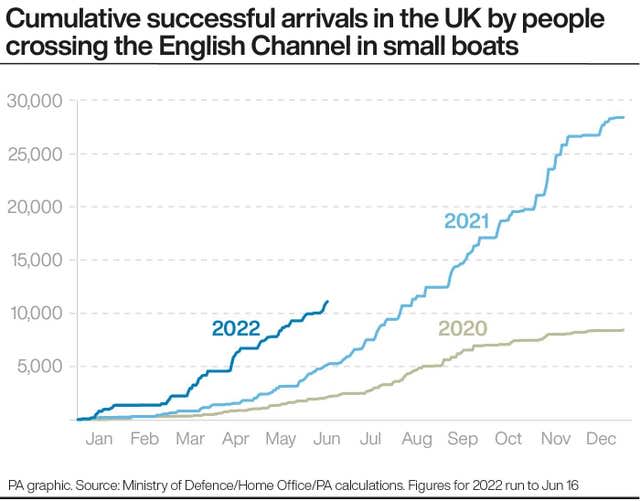Home Office begins 12-month trial electronically tagging Channel migrants

Some people arriving in the UK via small boats or the back of lorries will be electronically tagged as part of a Home Office trial programme.
The department said the 12-month pilot, which began on Wednesday, will test whether electronic monitoring is an effective way to give immigration bail to those who arrive in the country using “unnecessary and dangerous” routes.
It comes after a ruling by the European Court of Human Rights (ECHR) on Tuesday prevented the first flight from leaving under the Government’s new policy of deporting asylum seekers to Rwanda.
Boris Johnson defended the tagging plan, saying it was essential people who arrived illegally were not simply able to disappear into the rest of the country.
Speaking to reporters at RAF Brize Norton after returning from Ukraine, the Prime Minister said: “This is a very, very generous welcoming country. But when people come here illegally, when they break the law, it is important that we make that distinction.
“That is what we are doing with our Rwanda policy. That is what we are doing with making sure that asylum seekers can’t just vanish into the rest of the country.”
However, Labour leader Sir Keir Starmer, campaigning in the Wakefield by-election, accused the Government of “chasing headlines”, saying it would do nothing to halt the activities of the people trafficking gangs.
“What I want is a serious response because nobody wants these journeys across the Channel to be made, these perilous journeys,” he said.
“Everybody want to clamp down on the gangs. That requires grown-up work with the French authorities and upstream work to actually tackle these gangs.”
The BBC reported the first to be tagged under the bail programme were likely to be those who had avoided being removed to Rwanda.
The Home Office said the trial will test whether tagging aids regular contact with those given bail and progresses their claims more effectively.
Those tagged will have to regularly report in person to authorities, may be subject to a curfew or excluded from certain locations, and failure to comply could see them returned to detention or prosecuted.
It comes after new figures revealed the number of people crossing the Channel to reach Britain this year has passed 11,000.
Analysis of Ministry of Defence data by the PA news agency shows 11,322 people have been brought to shore by Border Force or the RNLI after being rescued from small boats in the Channel, the world’s busiest shipping lane.
On Friday, 230 people on five small boats were brought to Britain.
The daily number has been decreasing steadily throughout the week after a high of 444 on Tuesday. That was the highest number since 654 on April 13.

Warm weather and calm seas this week may have encouraged an increase in attempted crossings.
With 13 days of June left to go the number of people crossing the Channel is almost double this time last year.
By the end of June 2021, 5,911 people had made the crossing so far that year.
PA analysis shows 346 boats have been used in Channel crossings so far this year, with an average of 33 people on board each one.


